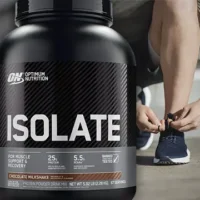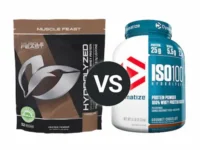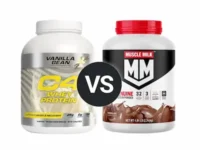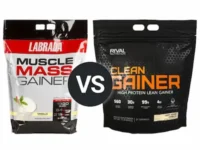Knowledge BaseYou're Questions Answered
When is the best time to consume protein powder after a workout?
The timing of protein powder consumption can significantly impact muscle recovery and growth. Consuming protein powder immediately after a workout is often recommended for optimal results, as this period is when the body is most receptive to nutrients, a concept known as the "anabolic window."
Importance of the Anabolic Window
The anabolic window refers to a period of about 30 minutes to 2 hours post-exercise when muscle protein synthesis is maximized. During this time, the body is primed to absorb and utilize nutrients more effectively to repair and build muscle tissue1. Consuming protein powder during this window can help enhance muscle recovery, reduce muscle soreness, and promote muscle growth2.
Optimal Timing
Most experts recommend consuming protein powder within 30 minutes to an hour after completing a workout to take full advantage of the anabolic window3. This immediate post-workout period is critical for replenishing amino acids and initiating muscle repair processes. Fast-digesting proteins, such as whey protein, are particularly effective because they quickly deliver amino acids to the muscles4.
Slower-Digesting Protein Powders
Slower-digesting protein powders, such as those derived from plant-based sources like pea or hemp protein, have a different absorption profile compared to whey protein. These proteins provide a more sustained release of amino acids over several hours. To ensure continuous amino acid delivery over the anabolic window, it's beneficial to consume these slower-digesting proteins shortly before or immediately after a workout. This helps maintain a steady supply of amino acids to the muscles during the critical recovery period5.
Combining fast-digesting and slower-digesting proteins can also be an effective strategy. For example, you might take a whey protein shake immediately after your workout to quickly deliver amino acids, followed by a plant-based protein source within a few hours to sustain amino acid availability and support ongoing muscle repair6.
Benefits of Post-Workout Protein Intake
- Enhanced Muscle Protein Synthesis: Consuming protein powder after a workout provides the body with essential amino acids that stimulate muscle protein synthesis, helping to repair and grow muscle fibers damaged during exercise7.
- Reduced Muscle Soreness: Protein intake post-exercise can help reduce delayed onset muscle soreness (DOMS), allowing for quicker recovery and less discomfort8.
- Improved Recovery: Adequate protein intake after workouts helps replenish muscle glycogen stores and repair muscle tissue, leading to faster recovery times and improved performance in subsequent workouts9.
Practical Considerations
To maximize the benefits of protein powder, consider incorporating it into a post-workout shake or smoothie. Combining protein powder with carbohydrates, such as fruit or oats, can further enhance muscle recovery by replenishing glycogen stores and promoting insulin release, which aids in nutrient uptake by the muscles10.
While the anabolic window is an important concept, the overall daily protein intake and timing throughout the day also play a significant role in muscle health and performance. Ensuring consistent protein consumption in each meal can support ongoing muscle repair and growth.
- Schoenfeld, B. J., Aragon, A. A., Wilborn, C. D., Urbina, S. L., Hayward, S. E., & Krieger, J. W. (2013). Pre- versus post-exercise protein intake has similar effects on muscular adaptations. PeerJ, 1, e282.
- Phillips, S. M., & Van Loon, L. J. C. (2011). Dietary protein for athletes: From requirements to optimum adaptation. Journal of Sports Sciences, 29(sup1), S29-S38.
- Tipton, K. D., Elliott, T. A., Cree, M. G., Aarsland, A. A., Sanford, A. P., & Wolfe, R. R. (2007). Stimulation of net muscle protein synthesis by whey protein ingestion before and after exercise. American Journal of Physiology-Endocrinology and Metabolism, 292(1), E71-E76.
- Jäger, R., Kerksick, C. M., Campbell, B. I., Cribb, P. J., Wells, S. D., Skwiat, T. M., ... & Antonio, J. (2017). International Society of Sports Nutrition Position Stand: Protein and exercise. Journal of the International Society of Sports Nutrition, 14(1), 20.
- Gorissen, S. H., & Witard, O. C. (2018). Characterising the muscle anabolic potential of dairy, meat and plant-based protein sources in older adults. Proceedings of the Nutrition Society, 77(1), 20-31.
- Ranchordas, M. K., Rogerson, D., Soltani, H., & Louis, J. (2018). Breakfast consumption and exercise performance: A randomized controlled trial of the effects of cereal consumption or water only on muscle damage, inflammation, and stress in regularly trained males. Journal of the International Society of Sports Nutrition, 15(1), 26.
- Moore, D. R., Robinson, M. J., Fry, J. L., Tang, J. E., Glover, E. I., Wilkinson, S. B., ... & Phillips, S. M. (2009). Ingested protein dose response of muscle and albumin protein synthesis after resistance exercise in young men. American Journal of Clinical Nutrition, 89(1), 161-168.
- Etheridge, T., Philp, A., & Watt, P. W. (2008). A single protein meal increases recovery of muscle function following an acute eccentric exercise bout. Applied Physiology, Nutrition, and Metabolism, 33(3), 483-488.
- Beelen, M., Burke, L. M., Gibala, M. J., & van Loon, L. J. C. (2010). Nutritional strategies to promote postexercise recovery. International Journal of Sport Nutrition and Exercise Metabolism, 20(6), 515-532.
- Ivy, J. L. (2004). Regulation of muscle glycogen repletion, muscle protein synthesis and repair following exercise. Journal of Sports Science & Medicine, 3(3), 131-138.
Related Questions
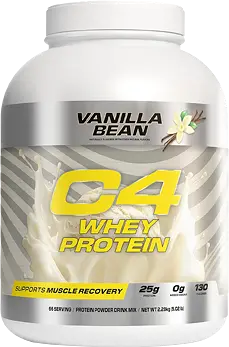
Your Answer
We are a participant in the Amazon Services LLC Associates Program, an affiliate advertising program designed to provide a means for us to earn fees by linking to Amazon.com and affiliated sites.

